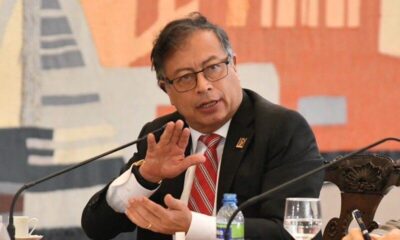Colombia Should Not Discard Its Fiscal Rule — and It Won’t
Following on from the announcement of Colombia’s third-quarter GDP reading earlier this month (-0.3% year-over-year), there was predictable mud-slinging, with politicians, economists and journalists all having their say.
Photo: Colombian President Gustavo Petro speaking in the Leadership for Latin America session at the World Economic Forum Annual Meeting in Switzerland in January 2023. (Photo credit: World Economic Forum / Boris Baldinger)
Initially we saw Finance Minister Ricardo Bonilla lay the blame squarely on Banco de la República and its failure to lower rates over the past two months, thereby continuing their chokehold on the local economy. At this juncture, the government’s perspective is clearly the correct one — and it’s a perspective shared by the National Business Association of Colombia (ANDI), FENALCO and Asobancaria.
The last six months of macro data — ranging from retail sales to manufacturing production to new home sales to loan growth — have all pointed to a slowdown. But the central bank, or at least 5 of the 7 committee members, has ignored all calls to lower rates, an easing move that would send a positive signal to markets and the private sector at large.
By Thursday, the day after the GDP data was released, the government argument, in the form of statements from President Gustavo Petro, had pivoted.
This time, there was a call to adjust or remove the nation’s “fiscal rule,” a long-held policy that limits the level of public spending. The rationale being that, if the central bank wasn’t going to allow the private sector to refloat the economy, the public sector would have to be the driver. The Colombian peso, which had recently strengthened to below 4,000 to $1 USD, fell initially on the weaker GDP print — and then dropped further as the debate over the fiscal rule made its way into the press.
This may well be grandstanding on behalf of Petro in order to further highlight the failing of the central bank and to put further pressure on them to cut rates. But, in Colombia, some things are sacrosanct — and the fiscal rule is one of them. Years ago, when accompanying overseas funds to the Finance Ministry, foreigners were always impressed — even taken back! — that Colombia’s fiscal rule was not merely a guideline but in fact a cemented “rule.”
Petro is being told by the ANDI and Fedesarrollo that touching the fiscal rule would damage the country’s credibility, a fair observation. Ex-President Iván Duque said the same — but as the man who fumbled and lost Colombia’s investment grade rating, he sits in a glass house.
But, here, we have two pieces of hypocrisy.
1. Among those criticizing Petro is his former Finance Minister José Antonio Ocampo. Put simply, Ocampo is telling Petro to quit complaining about public spending and noting that the execution of the 2023 budget is way behind schedule. Instead of altering the fiscal rule, concentrate on what has already been approved.
2 Hypocrisy II lies with the federations Camacol Colombia and Fenalco, which, respectively, called for the government to subsidize social housing mortgages and to not reduce the Fuel Price Stabilization Fund (FEPC) fuel subsidy. Both of those measures create the same effect on the bottom line. Whether it is fiscal rule adjustment or subsidies, it all comes out of the same pocket.
Clearly, the fiscal rule shouldn’t be touched.
And it won’t be.
The central bank, though, needs to get busy in a hurry.
























